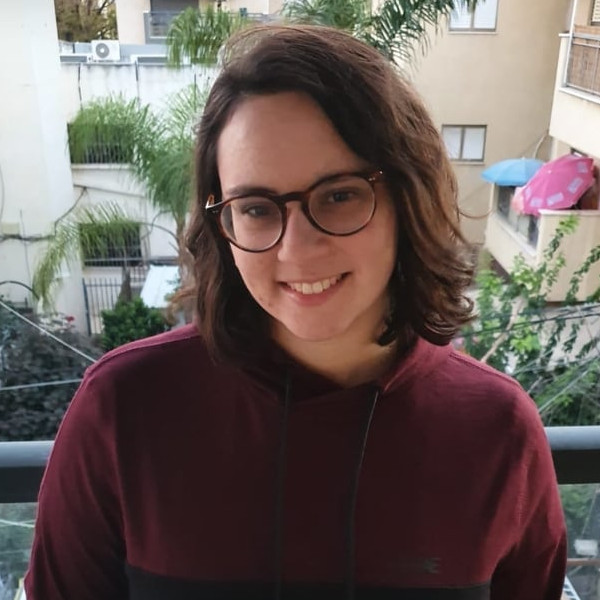Interviews with Olim
Each month, we interview an oleh or olah for our newsletter.
We invite you to read the stories of LGBTQ+ people who have made Israel their home.
"I don’t have to choose between queerness and Jewishness any more."
Interview date: January 2021
Q. Where were you born and where did you grow up?
A. I was born in Kentucky and moved to Indiana when I was nine. There’s not much Jewish community there, so for Jewish geography purposes I’ll add that I attended Brandeis and went to Ramah Wisconsin for 11 years.
Q. At what age did you come out? And how did it go?
A. I don’t really have a “coming out” story, to be honest. In high school most of my friends were lesbians, and I was the one and only who liked boys. All the queer folks who knew me in passing thought I was gay too, so I guess you could call me “gay by association” during that time. It actually wasn’t until college, when I started taking gender studies courses and met other nonbinary folks that I came to realize I was genderqueer/fluid and that I had always felt like more of a boy than anything else, although not in such a way that I want to transition.
The closest I came to officially coming out was saying that I don’t have any preferred pronouns when people asked, and posting memes about gender being fake on Facebook. My parents found out I ID as queer when I sent them a little piece published on a blog I wrote for where I called myself queer – I had been certain they already knew! But they don’t really know what it means and I don’t have any desire to tell them. I’m very lucky to have amazing parents who would still love me, but I don’t want to deal with them seeing me any differently, and it doesn’t bother me that they think I’m a girl. Pretty much everyone else in my life now knows, and that’s good enough for me!
Q. Were you involved at all in the LGBT community back home?
A. Yes! I was in the gay-straight alliance in high school, and in college I worked at the campus Queer Resource Center where I did peer counseling.
Q. What is your involvement (if any) in the LGBT community in Israel?
A. I try to come to LGBT Olim events as much as possible! And I am on the roller derby team, which is of course the gayest sport.
Q. How long since you made Aliyah?
A. Three years!
Q. Did you move here on your own or with family/friends/significant other?
A. On my own, kind of. I came with a program for lone soldiers called Garin Tzabar. Through the program, I lived on a kibbutz for my first year with a group of other American lone soldiers. It made getting set up with the bureaucracy much smoother, but if I had to do it over I wouldn’t have used the program. Aside from many issues with the program itself, I was with a very queerphobic group of kids and spent that year just awash in dysphoria. I should have just moved to Tel Aviv on my own!
Q. Why did you make Aliyah?
A. Big question. The short answer is to draft to the army. The long answer is that I lived in Haifa with my family the year I was 12, and even at that age I felt a sense of belonging that I hadn’t felt anywhere else. I grew up as the token Jew, the only one any of my friends knew, and being here was the first time I didn’t feel like an outsider. I decided I wanted to draft because it didn’t feel right to me that the kids I met would have to and I could just go to college and not serve what I still considered to be my homeland.
At the same time, I went to a Jewish camp every summer, and while it was great to be surrounded by Jews, I really didn’t fit in socially. It was a super heteronormative environment with tons of pressure to conform, so I never got to feel like I could be Jewish and queer in the same place. I went to Brandeis for college specifically because of the Jewish community hoping that I could finally be my authentic self, but found that even there I was straddling the line between the Jewish and queer/activist communities.
I finally realized that Israel might be the only place where being Jewish really doesn’t preclude you from participating in other identity-based communities, and so far that is proving true. The queer, Jewish, and Zionist friends I’ve met here are people I’m able to connect with in ways I never could with my American friends. Granted, my friends are nearly all olim themselves, but they share the mentality that brought us to immigrate.
Q. How is it going so far?
A. It’s going okay. I’ve been frustrated lately with Israelis and the culture, especially their views on the pandemic. But it’s a loving frustration. I can’t see myself living anywhere else!
Q. What do you do in terms of work?
A. I’m getting my Master’s in education policy with a focus in social change at Tel Aviv University, and just beginning to freelance write a bit on the side. I’m hoping to get more clients soon!
Q. How is your Ivrit?
A. Reluctant.
Q. What has been your biggest challenge so far?
A. Recently I think it’s been homesickness. I find myself thinking about my family and my hometown all the time. I somehow feel like my relationship with my parents has gotten better since I’ve been here, which makes being away from them that much harder. And I miss being surrounded by people with self-awareness. My theory about Israelis is that they have no self-awareness – it literally does not occur to them to think about how they are being perceived by others, so they can be as loud or illogical as they want and that can get really frustrating. There are things I love about Israeli culture, but this is the thing I have the hardest time with.
Q. How do you perceive the Israeli LGBT community?
A. My exposure has been a bit limited because I don’t like using Hebrew (yes, this is my own fault, and yes I am working on it). But my experience is that it’s very gender-separated. I’ve been to gay clubs with hundreds of gay men, but had trouble finding even one lesbian party to attend, and forget about finding nonbinary groups. From what I understand you have to know the right people who will add you to the right Facebook groups – frankly I don’t understand why it all needs to be so exclusive. I’ve met some awesome queer Israeli women on the derby team, though!
Q. How is being LGBT in Israel different to back home?
A. For me, the biggest difference is that I don’t have to choose between queerness and Jewishness anymore. In America, Jews are being increasingly excluded from queer spaces unless they promise really hard that they hate Israel, so I always had to figure out how much of my Jewishness wouldn’t make people uncomfortable. Here I don’t have to worry about that!
Q. If you were making aliyah now, would you do anything differently?
A. I would move to Tel Aviv from day one! And I would probably work harder to learn Hebrew before I came…
Ruth

Our Newsletter
Sign up if you would like to receive a monthly email listing events of interest to LGBT English-speakers in Israel, an interview with an oleh/olah and other useful information.
Want to be interviewed?
Complete the form below and we will get back to you.
Our Newsletter
Sign up if you would like to receive a monthly email listing events of interest to LGBT English-speakers in Israel, an interview with an oleh/olah and other useful information.
Want to be interviewed?
Complete the form below and we will get back to you.


